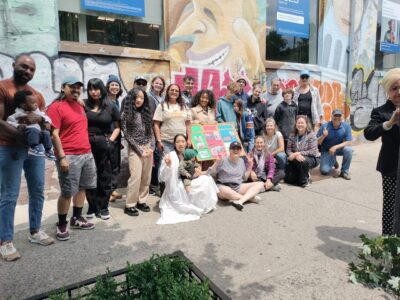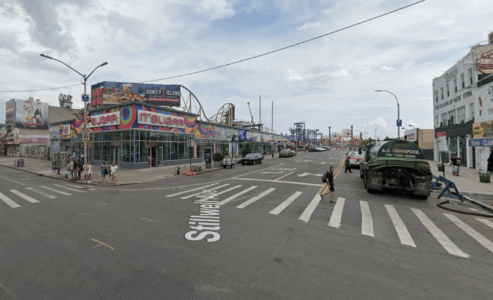BATH BEACH — It was supposed to be a town hall on transit issues in Southwest Brooklyn, but U.S. Rep. Max Rose spent a great deal of time Friday night talking about his decision to support an impeachment inquiry of President Donald Trump.
“This president brought this on himself. He has no one else to blame,” Rose told residents attending his town hall on transportation at Il Centro, the Italian-American community center in Bath Beach.
While the focus of the town hall was on transportation, Rose answered questions on a range of topics that had been submitted in writing by constituents, including a number of questions on the issue of impeachment.
Calling impeachment “a tragic day for the U.S.A.,” Rose said the nation faces an incredibly serious question on the issue of whether Trump sought to withhold military aid from Ukraine in exchange for that country investigating his potential Democratic opponent Joe Biden.
“Did the president use the power of the state for his own personal political gain? With the bevy of things to discuss with the Ukrainian president, why discuss his rival? Why was the transcript hidden?” Rose said.
Rose, a Democrat representing Southwest Brooklyn and Staten Island, was elected in 2018 in New York’s 11th Congressional District, a district that the Republican Trump carried by 9.8 percent over Democrat Hillary Clinton in 2016.
Rose had been one of the last Democratic holdouts on the issue of an impeachment inquiry, but announced his support for the probe on Oct. 2.
“We have to show the American people no one is above the law. We also have to engage the American people,” said Rose, who acknowledged that House Democrats will have to work to convince the American public that the inquiry will be a serious fact-finding mission and not a partisan exercise.
“I swore an oath to the Constitution, not to politics,” Rose said. “This investigation is moving forward in a perfectly constitutional manner.”
But with the Ukraine situation, “we’re dealing with something unprecedented,” the freshman lawmaker said.
On transit issues, Rose took questions on a number of topics, including a proposal to install a bike lane on the Verrazzano-Narrows Bridge. He said he is opposed to the idea.
Jean Ryan, who depends on a wheelchair to get around, charged that express bus drivers do not know how to operate the bus wheelchair lift. As a result, she is often left at the curb, she said. “Express bus drivers are not trained to get a wheelchair user on and off the express bus quickly,” she told Rose.
MTA representative Patrick Pitts said all bus drivers are trained. He suggested that Ryan report bus drivers who do not know how to operate the lift.
One man complained about homeless people on buses and in the subway system. MTA representatives said the agency does homeless outreach, but cannot throw paying customers out of the transit system, even if they are homeless.
Rose called on people to have compassion for the homeless. “I don’t know any homeless person who wants to be homeless,” he said.
Rose talked about a proposal he is promoting with Councilmember Justin Brannan, Assemblymember Mathylde Frontus and State Sen. Andrew Gounardes to have the MTA introduce a shuttle service to transport residents to NYC Ferry at the 69th Street Pier in Bay Ridge.
Rose also mentioned that he, Brannan, Frontus and Gounardes have written to the MTA to implore the agency to improve service on the slow-moving R train.
Brannan, who attended the town hall, said riders face a nightmare. “What we go through every day as commuters, I know the struggle quite well,” he said.
Two representatives of New York City Transit, Luke DePalma and Evan Bialostosky, offered an overview of the Brooklyn Bus Network Design in which the agency will be taking a close look at all bus lines in Brooklyn with an eye toward changing bus routes. The study will take a year to complete.
“We are erasing the bus map and rebuilding it again,” Bialostosky said.
The bus lines need to be looked at, according to the New York City Transit representatives, because the bus routes are modeled after the old trolley routes and, for the most part, have not been changed.
Bus schedules will also be studied. Researchers are taking into consideration the fact that many riders work at night. Major arteries where large numbers of people live will have more buses. New York City Transit will also look into spreading bus stops out along routes so that the stops aren’t too close together.
Members of the public will be given an opportunity to express their views, according to DePalma, who said there will be community engagement sessions, open house events and workshops. “You will be able to participate with our planners,” he told the audience.
The MTA will issue a preliminary report in the second quarter of 2020. The final plan will be released in late 2020.

 Sunset Park residents look to form new mural at 54th Street
Sunset Park residents look to form new mural at 54th Street  Man charged with attempted kidnapping after allegedly grabbing six-year-old in Coney Island
Man charged with attempted kidnapping after allegedly grabbing six-year-old in Coney Island